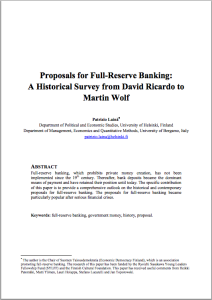A History of Sovereign Money Proposals from Patrizio Laina


Patrizio Laina, a PhD candidate at the University of Helsinki, has written a short but very comprehensive overview of the history of proposals to take the power to create money away from banks. Laina traces the ideas back right to the 1830s, and ends with the proposals of Positive Money and Martin Wolf in 2015. This is one of the best overviews that I’ve seen of the history of these ideas, and well worth a read. (It’s in plain English).The full paper is well worth reading.Introduction:
“[Full reserve banking, i.e. preventing banks from creating money] has been proposed and even implemented as a solution to financial instability a number of times in the past. Thus, the idea of monetary reform should be seen as a historical continuum. In the UK the Bank Charter Act of 1844 prohibited private money creation through fractional-reserve banking by requiring that bank notes (which were the prevailing means of payment) should be fully-backed by government money. The National Acts of 1863 and 1864 achieved the same goal in the US.
“The prohibitions, however, did not include bank deposits, which slowly became the dominant means of payment. In the 1930s, the Chicago Plan was almost adopted in the US, but the FRB idea was watered down in the Banking Acts of 1933 (better known as the Glass- Steagall Act) and 1935. Instead of preventing private money creation in the form of bank deposits, the Banking Acts separated commercial and investment banking, provided deposit insurance and improved government’s control over monetary policy and money supply. Currently there are no examples of economies where the majority of money does not come into existence as a consequence of bank lending.
“Now, in the aftermath of the Global Financial Crisis (GFC), preventing private money creation in order to ensure financial stability has once again become a topical issue.”